Eye Exam Basics:
Keep an eye on your vision to stay on top of your eye care and overall health with eye exams.
Comprehensive Guide to Eye Exams
You rely on your eyesight to connect to your surroundings and help you navigate day-to-day life. As a result, taking care of your eye health is essential. Eye exams play a significant role in eye care because they can measure your sight, help you detect potential eye diseases, and preserve your vision.
While eye exams are important for ensuring that vision prescriptions are up to date, they can also be useful for preventive maintenance regardless of your eye health. In some cases, people may not be aware of their eye issues due to a lack of symptoms. An optical exam can help facilitate early intervention and minimize further or permanent damage.
Aside from vision problems, an optical exam can also help detect other health conditions. The eyes offer a non-invasive view of the natural state of your blood vessels. During an exam, the eye doctor can identify changes in your blood vessels, which can help detect and diagnose diseases such as diabetes, atherosclerosis, and high cholesterol
Important Eye Exam Milestones
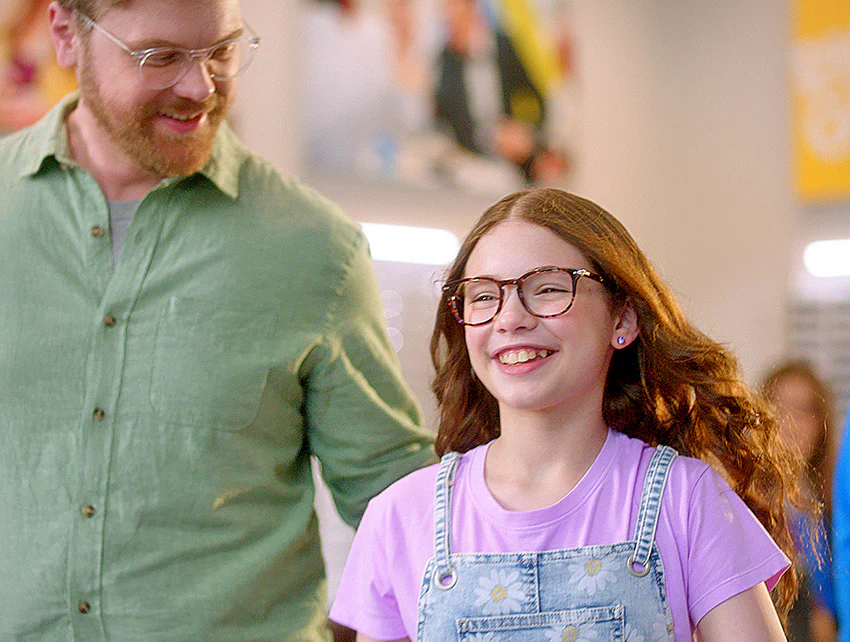
Children
Children
When it comes to eye care, early detection is the name of the game—and that extends to all ages. For children aged 3 or younger, examining their eyes early helps avoid the most common childhood eye complications, such as:
- Lazy Eye
- Misaligned Eyes
- Cross-Eyes
Additionally, having their eyes examined again before their first year of kindergarten ensures that poor vision won’t get in the way of their education.
When it comes to eye care, early detection is the name of the game—and that extends to all ages. For children aged 3 or younger, examining their eyes early helps avoid the most common childhood eye complications, such as:
- Lazy Eye
- Misaligned Eyes
- Cross-Eyes
Additionally, having their eyes examined again before their first year of kindergarten ensures that poor vision won’t get in the way of their education.
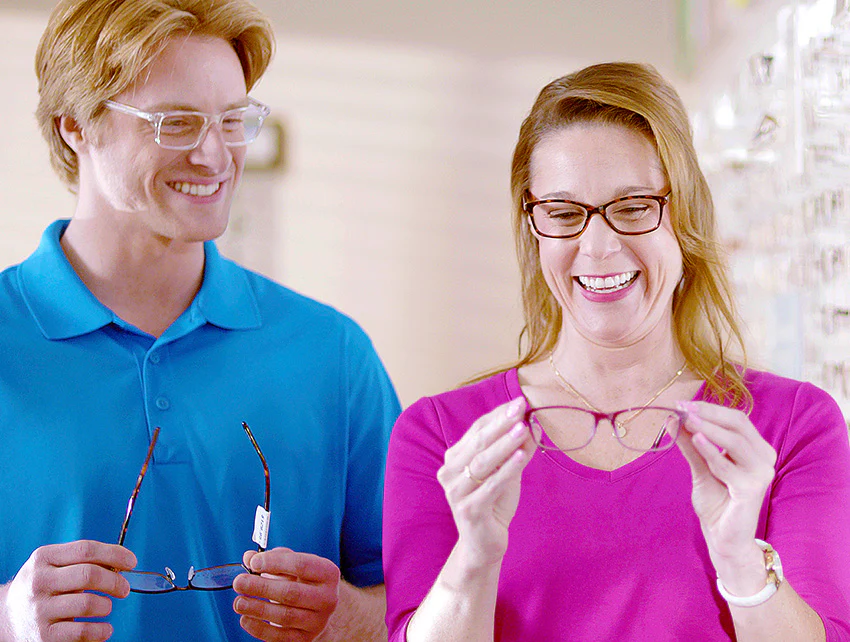
Adults
Adults
The American Academy of Ophthalmology recommends a complete eye exam once you turn 40 since you become more likely to develop an eye disease. Once you hit 60, have your eyes checked every year or two, or more frequently if you:
- Wear glasses or contacts
- Have been diagnosed with a chronic condition like diabetes that puts you at a higher risk for eye disease
- Have a family history of eye disease or vision loss
The American Academy of Ophthalmology recommends a complete eye exam once you turn 40 since you become more likely to develop an eye disease. Once you hit 60, have your eyes checked every year or two, or more frequently if you:
- Wear glasses or contacts
- Have been diagnosed with a chronic condition like diabetes that puts you at a higher risk for eye disease
- Have a family history of eye disease or vision loss

All Ages
All Ages
Beyond the critical milestones above, we recommend adding eye checkups to your regular health routine by visiting an eye clinic yearly.
Beyond the critical milestones above, we recommend adding eye checkups to your regular health routine by visiting an eye clinic yearly.
Eye Exam Frequency for All Ages
Beyond the critical milestones above, adding eye checkups to your regular health routine is essential. Here are various eye exam frequency recommendations based on different age groups according to the American Optometric Association:
- Age 3-5: Children aged 3 to 5 should go for an examination at least once between those ages or as recommended if they are at-risk patients.
- Age 6-17: An eye exam should be done at least once before the first grade and annually throughout. At-risk patients should go as recommended.
- Age 18-39: Adults between 18 and 39 should take an eye and vision exam at least once every two years. The exams should be annual or as recommended if they are at risk of specific conditions.
- Age 40-64: This age group has the same recommended examination frequency as the 18-to-39-year-old group or as recommended for at-risk patients.
- Age 65 and older: Adults 65 or over are advised to have annual eye exams or as recommended when they are at risk.
At-risk patients have underlying issues that can affect eye health, such as potential ocular disease or previous eye surgery. Depending on your prescription and condition, your provider will inform you if you are at risk and recommend the ideal eye examination frequency.
How Are Eye Specialists Different From One Another?
There are three kinds of eye specialists, and they all start with the letter ‘O’.
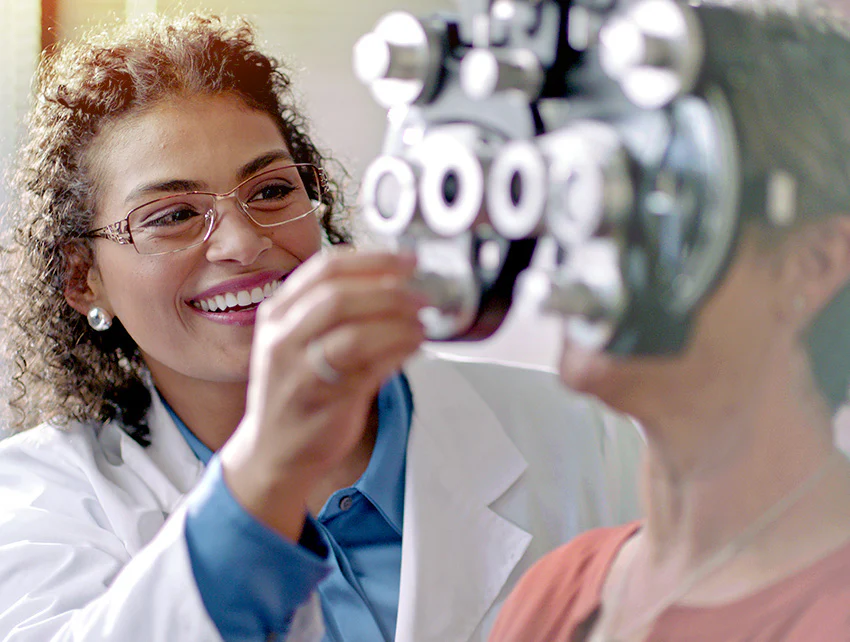
Optometrist
Optometrists are the most common eye doctor you’ll see. They give complete eye exams, test your vision, write prescriptions, and diagnose and treat common eye disorders and diseases.
Ophthalmologist
As medical eye doctors, ophthalmologists do all the same things an optometrist does, except they’re qualified to tackle more complex eye diseases and can perform eye surgery.
Optician
This optical specialist handles the procurement, assembly, fitting, and sale of eyeglasses. Occasionally, they’ll sell contact lenses as well. They are not medically trained eye doctors and do not provide evaluations.
Optometrist
Optometrists are the most common eye doctor you’ll see. They give complete eye exams, test your vision, write prescriptions, and diagnose and treat common eye disorders and diseases.
Ophthalmologist
As medical eye doctors, ophthalmologists do all the same things an optometrist does, except they’re qualified to tackle more complex eye diseases and can perform eye surgery.
Optician
This optical specialist handles the procurement, assembly, fitting, and sale of eyeglasses. Occasionally, they’ll sell contact lenses as well. They are not medically trained eye doctors and do not provide evaluations.
How to Prepare for an Eye and Vision Exam
Preparing for an eye appointment can help make the process run smoothly and efficiently. Preparation before your visit is simple and only involves a few steps:
- Make a note of the symptoms you are experiencing, if any, and disclose them to your optometrists or ophthalmologists before the exam.
- Know your medical or family’s medical history.
- Bring your latest vision prescription, glasses, and lenses to the appointment.
- Inform your provider of the medications you take, including non-prescription medicine.
What Happens During An Eye Appointment?
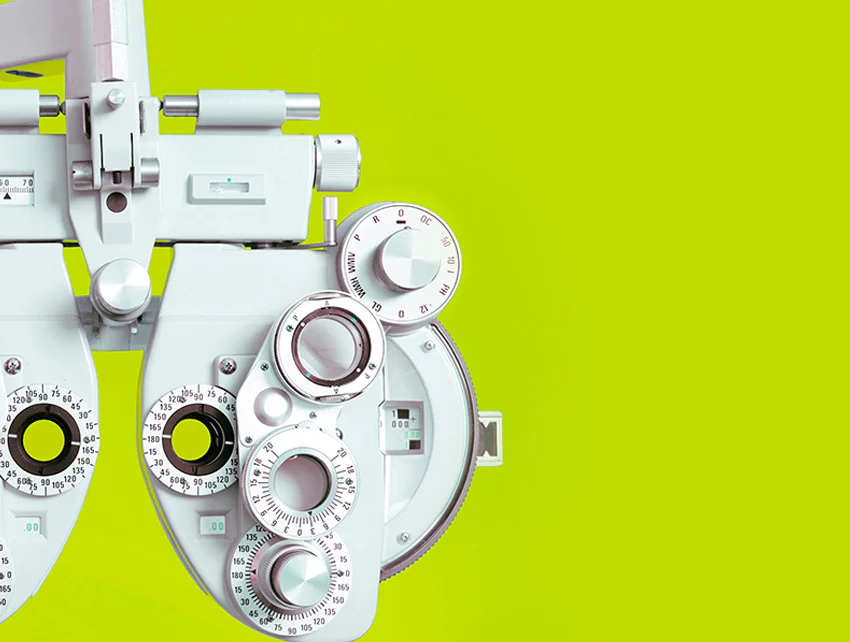
Eye exams include various tests depending on your reason for scheduling. The tests determine whether you need glasses or lenses, check for general eye problems, or assess your overall health. During a routine eye vision exam for a simple prescription update, there is usually a health evaluation focusing on each eye, checking muscles, blood vessels, dilation response, and synchronization with the other eye.
In addition, a few standard tests may also be included in a routine optical exam, including:
- Visual acuity: The well-known vision test (a Snellen Test) has big lettering near the top and small lettering near the bottom. The test helps determine optical clarity and sharpness.
- Refraction: The assessment involves looking through a device called the phoropter or refractor and focusing each eye on an eye chart. Visual refraction tests are done to figure out the prescription lens that can help improve your vision.
- Visual field test: This type of test is designed to measure peripheral vision and detect blind spots. It entails identifying moving objects from the corner of your eyes while you focus on an object straight ahead.
An eye appointment can include other tests that examine specific issues with the eyes. However, if it is a routine visit, your provider will quickly review the results with you, and you’ll leave the appointment in no time with a new prescription in hand.
Eye exams include various tests depending on your reason for scheduling. The tests determine whether you need glasses or lenses, check for general eye problems, or assess your overall health. During a routine eye vision exam for a simple prescription update, there is usually a health evaluation focusing on each eye, checking muscles, blood vessels, dilation response, and synchronization with the other eye.
In addition, a few standard tests may also be included in a routine optical exam, including:
- Visual acuity: The well-known vision test (a Snellen Test) has big lettering near the top and small lettering near the bottom. The test helps determine optical clarity and sharpness.
- Refraction: The assessment involves looking through a device called the phoropter or refractor and focusing each eye on an eye chart. Visual refraction tests are done to figure out the prescription lens that can help improve your vision.
- Visual field test: This type of test is designed to measure peripheral vision and detect blind spots. It entails identifying moving objects from the corner of your eyes while you focus on an object straight ahead.
An eye appointment can include other tests that examine specific issues with the eyes. However, if it is a routine visit, your provider will quickly review the results with you, and you’ll leave the appointment in no time with a new prescription in hand.
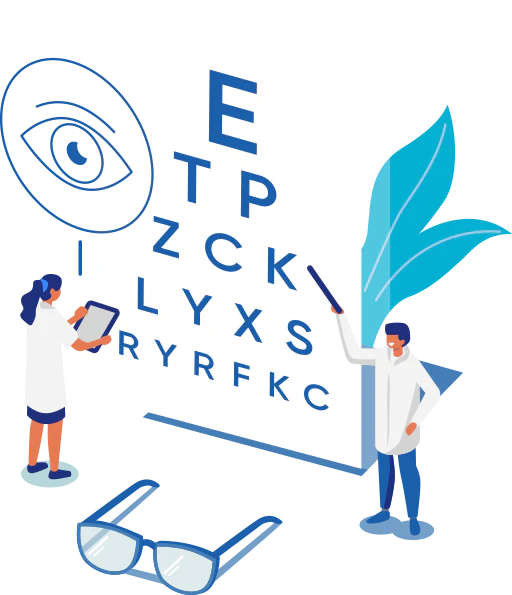
Schedule an Eye Exam Near You
Schedule an Eye Exam Near You
Eyemart Express partners* with skilled eye doctors to ensure there is always a professional in your area. Receive all the eye and vision care services you need in one place and enjoy more flexibility. Our providers take walk-ins, so you can see them without a long wait or making an appointment.
Are you looking for an eye exam near you? Check out our location below to find a professional eye doctor today.
*Eye exams are available by an Independent Doctor of Optometry at or next to our stores in most states. Doctors in some states are employed by Eyemart Express LLC.
Eyemart Express partners* with skilled eye doctors to ensure there is always a professional in your area. Receive all the eye and vision care services you need in one place and enjoy more flexibility. Our providers take walk-ins, so you can see them without a long wait or making an appointment.
Are you looking for an eye exam near you? Check out our location below to find a professional eye doctor today.
*Eye exams are available by an Independent Doctor of Optometry at or next to our stores in most states. Doctors in some states are employed by Eyemart Express LLC.